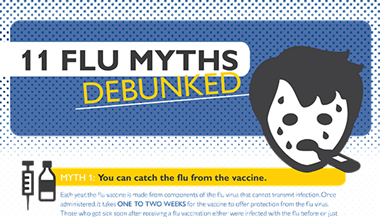The Flu: 3 Ways to Fight Back at 50-Plus
No one sails through a bout with influenza. This is especially true for adults older than age 65, who are more likely to have a weakened immune system.
Any dip in immunity can put you at a greater risk of developing more serious flu complications, such as pneumonia. Here’s how to strengthen your flu defense.

Fuel your flu-fighting system.
Boosting your immune system can help you fight off colds and influenza or at least shorten your recovery time.
- Start with good nutrition. Consume lots of fresh fruits and vegetables, and consider adding turmeric to recipes. This yellow-orange spice has been shown to reduce inflammation and boost immunity, says Johns Hopkins geriatrician Alicia Arbaje, M.D., M.P.H.
- Defend with vitamin D. It’s critical, and not just to help you stay healthy. “Having adequate vitamin D helps your body assimilate the flu vaccine, making it work better,” Arbaje says.
- Try to keep stress in check. A few minutes a day of deep breathing and meditation boosts your flu-fighting ability.
- Don’t forget good old-fashioned handwashing.
Protect with a flu shot.
Each year, vaccine developers make their best assessment of what the dominant flu strain will be and create a vaccine to match. It isn’t always an ideal match (and the flu virus has a habit of mutating into other strains), but it’s always smart to get the flu vaccine, especially if you’re older. “Even if it’s late in the flu season, it’s worth it,” Arbaje says.
Ask about an antiviral.
If you do get influenza, stay home, get lots of fluids and rest, and don’t try to do too much too soon. If you notice flu symptoms early, ask your doctor about an antiviral drug like Tamiflu; it’s not a cure, but if taken early on it can shorten flu duration.
Having trouble distinguishing cold from flu? Know the differences.
Q&A:
When should you get a flu shot?
The vaccine takes around two weeks to become effective, so waiting until flu season has already begun leaves you vulnerable to the virus, says Johns Hopkins expert Michael Albert, M.D. The vaccine is typically available by September or October, and you should try to get your flu shot as early as possible. You’re better late than never, though. Even toward the end of winter, you can still benefit from the shot — especially if the flu season lasts longer than usual. Talk to your doctor or pharmacist to find locations near you.





